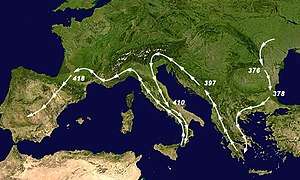418
| Millennium: | 1st millennium |
|---|---|
| Centuries: | |
| Decades: | |
| Years: |
| 418 by topic |
|---|
| Leaders |
| Categories |
|
| Gregorian calendar | 418 CDXVIII |
| Ab urbe condita | 1171 |
| Assyrian calendar | 5168 |
| Balinese saka calendar | 339–340 |
| Bengali calendar | −175 |
| Berber calendar | 1368 |
| Buddhist calendar | 962 |
| Burmese calendar | −220 |
| Byzantine calendar | 5926–5927 |
| Chinese calendar | 丁巳年 (Fire Snake) 3114 or 3054 — to — 戊午年 (Earth Horse) 3115 or 3055 |
| Coptic calendar | 134–135 |
| Discordian calendar | 1584 |
| Ethiopian calendar | 410–411 |
| Hebrew calendar | 4178–4179 |
| Hindu calendars | |
| - Vikram Samvat | 474–475 |
| - Shaka Samvat | 339–340 |
| - Kali Yuga | 3518–3519 |
| Holocene calendar | 10418 |
| Iranian calendar | 204 BP – 203 BP |
| Islamic calendar | 210 BH – 209 BH |
| Javanese calendar | 302–303 |
| Julian calendar | 418 CDXVIII |
| Korean calendar | 2751 |
| Minguo calendar | 1494 before ROC 民前1494年 |
| Nanakshahi calendar | −1050 |
| Seleucid era | 729/730 AG |
| Thai solar calendar | 960–961 |
| Tibetan calendar | 阴火蛇年 (female Fire-Snake) 544 or 163 or −609 — to — 阳土马年 (male Earth-Horse) 545 or 164 or −608 |

Visigothic migrations (376–418)
Year 418 (CDXVIII) was a common year starting on Tuesday (link will display the full calendar) of the Julian calendar. At the time, it was known as the Year of the Consulship of Honorius and Theodosius (or, less frequently, year 1171 Ab urbe condita). The denomination 418 for this year has been used since the early medieval period, when the Anno Domini calendar era became the prevalent method in Europe for naming years.
Events
By place
Roman Empire
- Emperor Honorius bribes Wallia, king of the Visigoths, into regaining Hispania for the Roman Empire. His victory over the Vandals in 416 forces him to retire to Andalusia. The Visigothic territory in Gaul now extends from the Garonne to the Loire, and becomes known as the Visigothic Kingdom.
- Theodoric I becomes king of the Visigoths. He completes the settlements in Gallia Aquitania and expands his military power to the south.
- In this year the Romans collect all the treasures which were in Britain, and hide some of them in the earth so that no one afterwards can find them, and some they take with them into Gaul.
By topic
Religion
- December 28 – Pope Boniface I succeeds Zosimus as the 42nd pope.
- Eulalius is elected antipope of Rome. He claims in a letter to Honorius his recognition as pope.
Births
Deaths
- Attaces, king of the Alans
- Wallia, king of the Visigoths
- December 26 – Pope Zosimus
References
This article is issued from
Wikipedia.
The text is licensed under Creative Commons - Attribution - Sharealike.
Additional terms may apply for the media files.